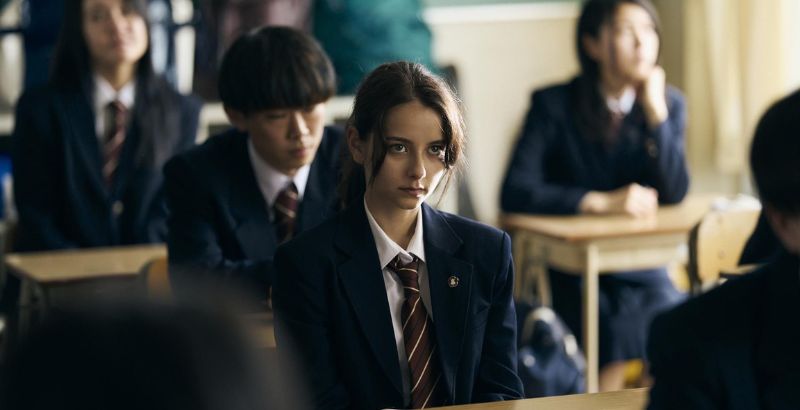
Young director Emma Kawawada makes her feature debut with My Small Land, a remarkable film that depicts the struggle of migrants living in Japan, a story that we rarely see in Japanese cinema.
Sarya (Lina Arashi) is a sixteen-year-old Kurdish girl who has friends, great grades, and a part-time job in a convenience store where she works alongside handsome Sato (Daiken Okudaira) to save money to fulfill her dream of being a teacher. She and her family arrived in Japan many years ago after her father Mazlum (Arashi Kahafi Zadeh) became a persona non grata for advocating Kurdish liberation. Sarya simply tells everyone she’s German to avoid difficult questions about Kurd history and her status as a refugee. She’s also struggling to understand and accept her roots.
Things get difficult for Sarya and her family when Mazlum’s refugee status is not accepted and all their visas are deemed invalid. They are not allowed to work or leave the Saitama prefecture without permission from the government. With the need to make money, the family is soon forced to deal with difficult decisions as well as the prejudice of everyone around them. They don’t have a country to call their own and the visa rejection exacerbates their feelings of exclusion.
Japan is a tough country for people looking to be recognized as refugees. In 2020, they granted said status to only 47 out of 3,936 applicants, a depressingly significant rise compared to 2019, when only 44 out of 10,375 applicants were accepted. My Small Land points a finger at this issue by highlighting how it deeply affects the life of a loving and talented young woman. Besides the restrictions that come with her rejected visa, Sarya has to face multiple instances of small but hurtful discrimination, most of it stemming from a lack of empathy or understanding from the general public; every time she explains any detail about her situation she’s faced with surprised and confused looks. People don’t seem to know the difficulties that the government makes the refugees go through.
This spills into Sarya’s inner conflict. In the first scene, we meet our timid protagonist in the middle of a Kurdish wedding; her uncomfortable stance soon turns into worry when a relative warns her she’s next in line for a nuptial celebration. This idea is explored throughout the film as Sarya struggles to accept the traditions of her people. She disagrees with her father, doesn’t understand the purpose of praying, and low-key rebels against the lack of liberty imposed on her. She doesn’t feel love toward her homeland because she grew up in Japan: she has embraced this country as her homeland. However, her status in limbo traps her between two cultures, one that she can’t fully accept and one that rejects her.
Sarya has to juggle all these things while also trying to be a teenager. She wants to keep working, go to college, and have a boyfriend. Instead, she has to deal with the pressures of finding money for her family, enduring casual discrimination, and the heavy emotional toll of feeling that she doesn’t belong anywhere. Lina Arashi, a model and actress of Iranian descent, is exceptional in this role: she’s always convincing as a reserved and resilient teenager, projecting just the right amount of fragility and confusion to avoid falling into melodramatic territory. It’s a controller performance that effectively embodies the many threads of this story. And she has this awkward chemistry with Daiken Okudaira too, which creates a cute romantic subplot that evolves into something more powerful.
Kawawada skillfully tackles the sociopolitical and cultural themes at hand through an intimate approach that, aided by Hidetoshi Shinomiya’s beautiful cinematography, allows you to empathize with her main character. She doesn’t use an in-your-face approach to talk about these problems, relying on subtlety and slow-burn storytelling instead. And by intermingling endearing and joyful moments, she gives a lightweight quality to what easily could’ve been a heavy story.
My Small Land is a bittersweet and beautiful cinematographic package that explores themes of belonging, rejection, and statelessness through a poignant social critique handled with impressive delicacy by Kawawada.
My Small Land screened at Fantasia Fest 2022.
My Small Land
-
Rating - 9/109/10
TL;DR
My Small Land is a bittersweet and beautiful cinematographic package that explores themes of belonging, rejection, and statelessness through a poignant social critique handled with impressive delicacy by Kawawada.






